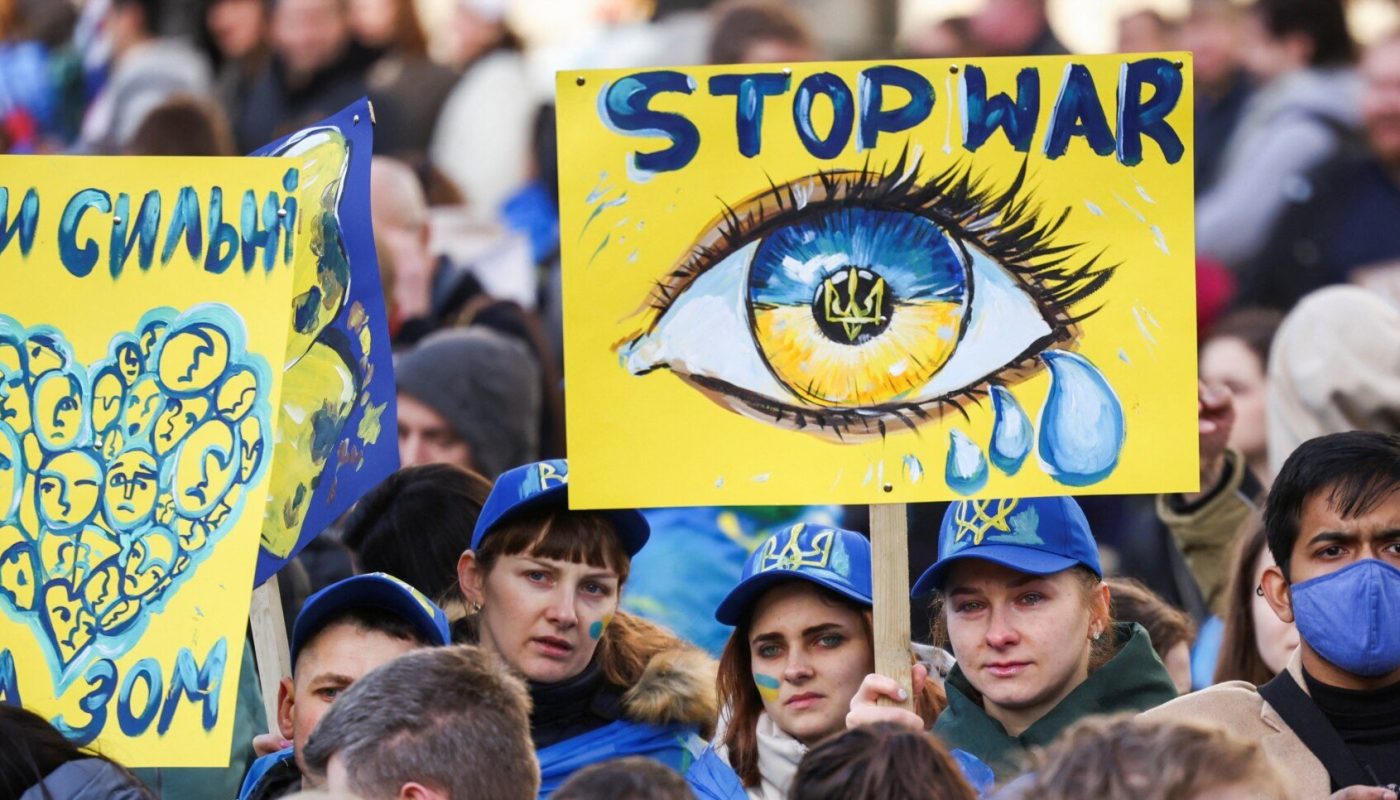Any war results in a whole gamut of emotions from all sides involved in a conflict. Both sides demand justice, cry for help and push their agenda – no matter who is seen as “a victim” and who is called “an oppressor”. As the full-scale war in Ukraine escalates in its violence and alleged war crimes are making the front pages, the amount of hate is skyrocketing. Ukrainians are losing their houses, family members, and lives due to the Russian invasion. At the same time, Russians are losing their jobs due to the sanctions and feel their helplessness against their government (I mean those who do not support the war). And both sides face hate and bullying no matter where they go.
An important disclaimer: this article (and all others that I have written) represent solely my opinion, which does not equal the university’s opinion. These articles aim to spread awareness about the war in Ukraine, provide useful resources for donations and highlight my own opinion from the standpoint of a person whose family is in danger in Ukraine. Please do consider this. I do not encourage the spread of hate or bullying; there is already enough pain that people have to go through.
Hate Crimes
In the Netherlands, twelve cars belonging to Ukrainian refugees temporarily housed in a cruise ship in Rotterdam were vandalized. According to the source, there were cars with Ukrainian and Dutch license plates in the parking lot, but the offenders chose to vandalize only the cars from Ukraine.
In Germany, a Pro-Russia car rally sparked outrage as it happened in early April, right after the news about the Bucha massacre shocked the whole world. The organizer of this event – a Russian entrepreneur – faced a lot of hate as his business page on Google Maps received hundreds of comments and pictures of dead Ukrainians (here is the source).
In Sweden, a Ukrainian woman became a victim of hatred based on her nationality. Her offender, a Russian woman, verbally attacked her and threatened to physically attack the Ukrainian woman. It happened near the Russian Embassy in Stockholm, where the Russian woman vandalized a Ukrainian flag. When asked why she was doing this, she called the Ukrainian woman a nazi and a prostitute, “like all Ukrainians are.” (here is the source and the video with English subtitles).
In Canada, Toronto police are investigating a suspected hate crime after vehicles with Russian flags were damaged at a movie theater parking lot in Etobicoke. Two males allegedly used sledgehammers to damage several parked vehicles that had Russian flags displayed on the windshields (source).
Relationship between the two nations
These are just a few incidents of hate happening between Russians and Ukrainians far away from the military theater. And I am sure that for the majority of people who are not directly involved in the war, it seems at least silly and destructive, which, of course, it is. And if you read my disclaimer above, you hopefully already know that I do not encourage the spread of hate. Committing hate crimes is definitely not an appropriate answer to the war, as it clearly does not help the situation. But what about hate in everyday life? For instance, my previous articles have also been seen as those which are supposedly spreading hate between the two nations. I have never encouraged hate and especially crimes. I have only expressed my opinion and given a few examples of why Ukrainians and Russians are not brotherly nations.
In my (unpopular and extremely biased) opinion, the relationship between the countries could be improved after there had been tens of years of PEACE. People tend to forget bad things, but not when at the same time people are being killed. People directly involved in the war (on both sides) cannot react neutrally and unemotionally to such violence.
Samuel P. Huntington in his book “The Clash of Civilizations and the Remaking of World Order”, which I recommend everyone to read, said:
“One grim Weltanschauung for this new era was well expressed by the Venetian nationalist demagogue in Michael Dibdin’s novel, Dead Lagoon: “There can be no true friends without true enemies. Unless we hate what we are not, we cannot love what we are.”
Let’s summarize this again to hopefully avoid misinterpretation and the first criminal record for me:
- Hate crimes are not the answer, and nobody should even consider committing them.
- People experiencing this war from different sides have a right not to like each other (as long as it does not result in a crime).
- People are entitled to emotions and opinions. If a Ukrainian and a Russian decide not to hold hands publicly and sing a song about peace and love – just let them be.
Read my previous articles:




Very interesting article Diana! I was surprised how violent some of these hate crimes outside of Ukraine are. I was wondering, when a hate crime like this happens in the Netherlands, Sweden, Germany or even Canada, what are the respective sanctions for people committing these crimes? Are countries following their normal juridical system? And if so, how do you manage to stay impartial as a system?
Thank you for the comment, Luca! Of course, if hate crimes are committed, the offenders must be punished based on the respective laws of the country – a crime is a crime. However, should countries allow pro-Russian demonstrations and the usage of Russian war symbols, considering it can lead to further violence?
That is a very interesting point Diana! There are two sides to your question. Firstly, a country should always base its legislation on neutrality. Multiple cases (ex. Dutroux), have proven that a judge should always be impartial, civil law (which is used in all countries stated above) states that a judge has to be impartial by law and any signs of a biased opinion could result in complete dismissal. Secondly, all actions that promote or initiate violence are forbidden by law.
In practice, if two laws go against each other we use prejudice (what has been said before). But as this case has no precedent and has not happened before under these particular circumstances you cannot apply prejudice. What would be the best option according to you?
I don’t think such hate crimes and protests with war symbols have no precedents at all. There are cases where people have been sentenesed for using forbidden symbols from the WWII. And now, some countries in Europe banned Russian war symbols (Latvia and Lithuania). In my opinion, the question here is whether more countries pass such laws to stop people from spreading these symbols while also creating legitimate grounds to hold such “offenders” accountable.
If there is no prejudice on the specific cases, they must look at similar cases. This arrest (https://www.sccjr.ac.uk/wp-content/uploads/2016/09/A-Review-of-the-Evidence-on-Hate-Crime-and-Prejudice.pdf) states that hate crimes should be punished according to the volume of affected people both direct and indirect in consequence of the hate crime. The crime itself should then also be looked at by the local authorities.